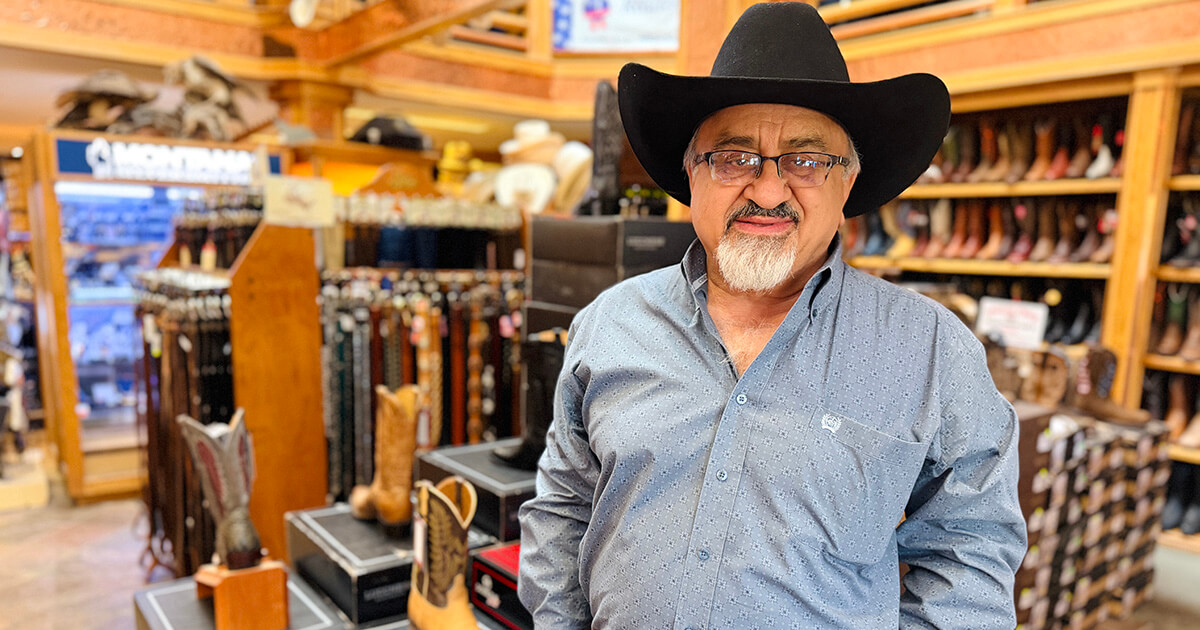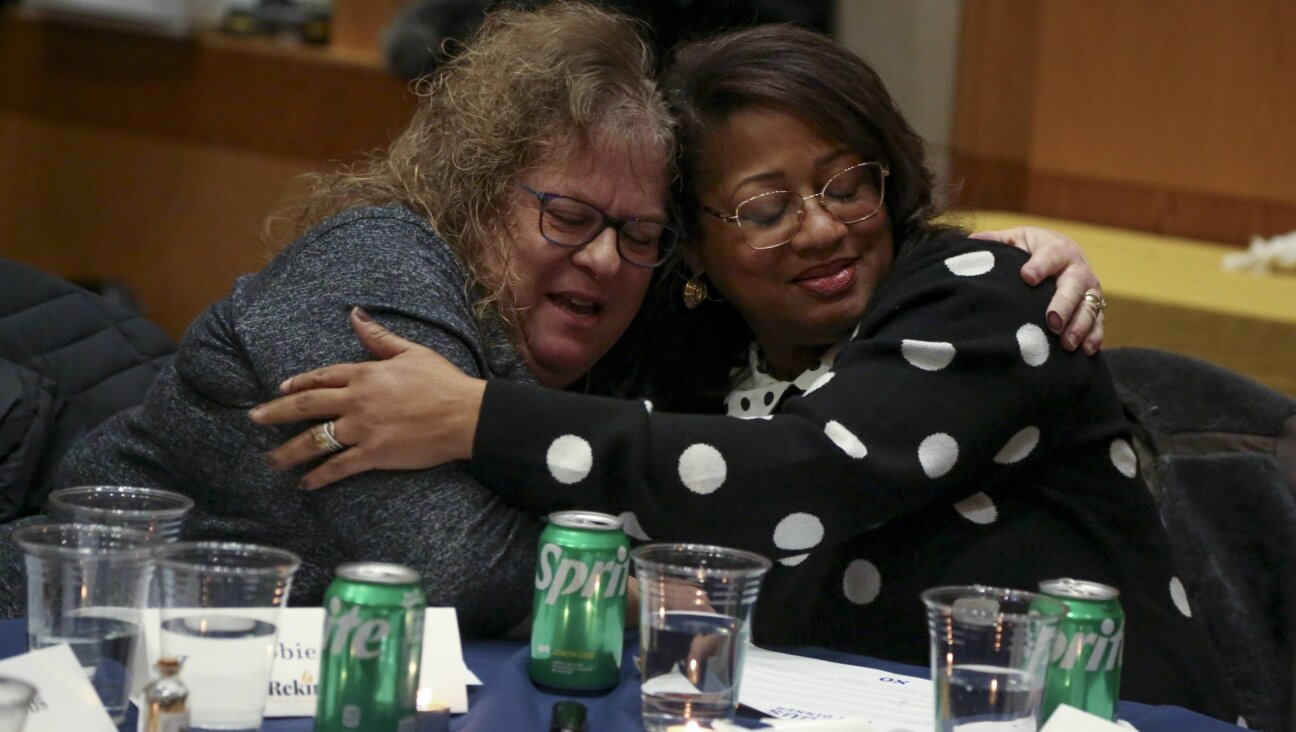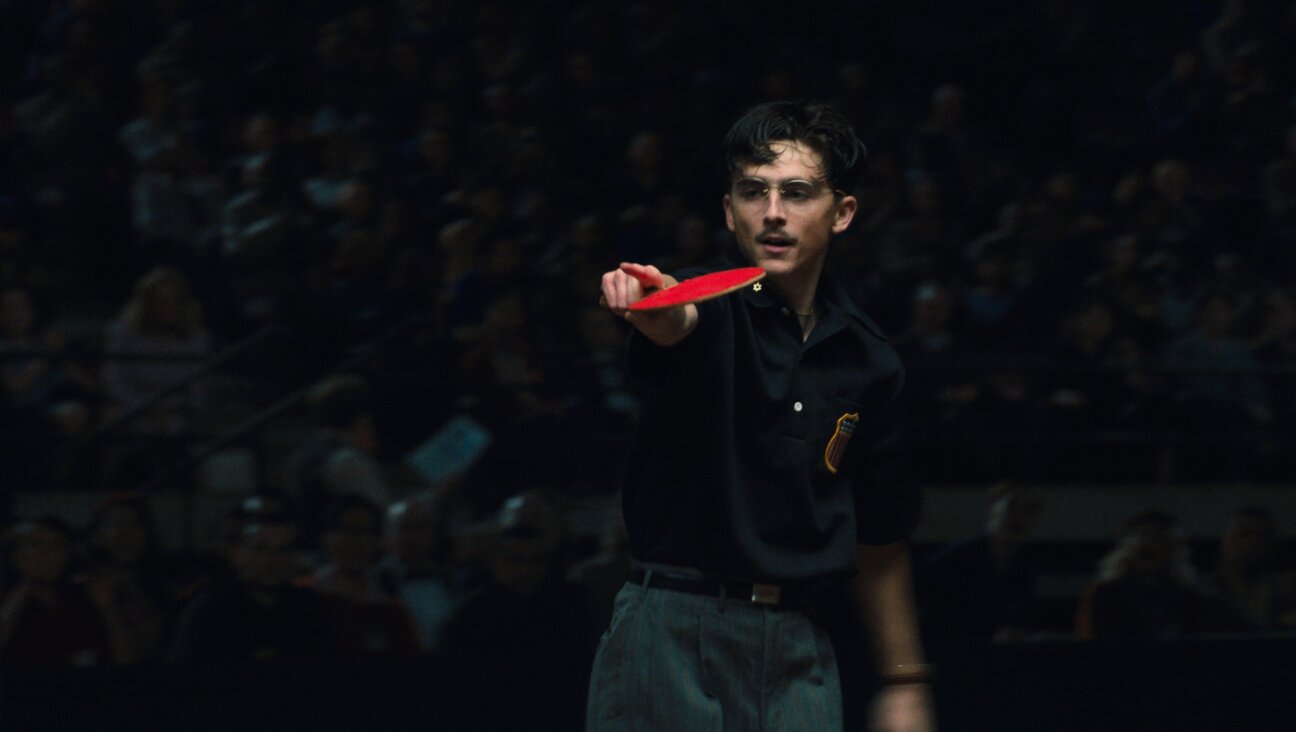Bus Attack Highlighting Links Of Israeli Extremists, Americans
Last week’s terrorist killing of four Israeli Arabs has cast light on a network of ties linking mainstream American Jewish groups to an extremist fringe in Israel that nurtured the Jewish gunman.
The killer, Eden Natan-Zada, was a 19-year-old Israeli army conscript who had gone AWOL with his weapon after refusing to participate in the upcoming evacuation of Gaza. His attack on a busload of Israeli Arabs was described by top Israeli officials as a terrorist act aimed at inciting Arab-Jewish violence and derailing the Gaza withdrawal.
Israel’s defense minister this week told a Knesset committee that at least nine other soldiers were AWOL with their weapons, and defense sources told the daily Ha’aretz that several of the missing soldiers appeared to match Natan-Zada’s psycho-social “profile.”
Natan-Zada had spent his last months in Kfar Tapuach, a tiny West Bank settlement that is a stronghold of the banned Kach movement founded by the late Rabbi Meir Kahane and branded as a terrorist group by the Israeli and American governments. In April, Natan-Zada participated in a march to the Temple Mount — banned and blocked by the Israeli police — that was led by a right-wing Tapuach rabbi, David Ha’ivri. Both men were among the 30 or so people arrested at the event, according to Israeli Defense Ministry officials.
Ha’ivri, a student of Kahane, is one of a number of Tapuach residents with ties to American organizations. He was hosted during a fundraising tour last fall by a number of Chabad-Lubavitch synagogues in the United States as well as by Americans for a Safe Israel, the organization that has led the most prominent anti-disengagement rallies. The tour came just six months after Ha’ivri was arrested by Israeli authorities for “incitement to violence.”
A few months before Americans for a Safe Israel, or AFSI, hosted the event in New York, the group mounted its own tour of Israel, during which members were given a lesson on the use of attack dogs by Ha’ivri and Mike Guzofsky, who is listed as a contact on the Web site Kahane.org, which is listed on the U.S. Treasury Department’s list of terrorist organizations.
In terms of ideology and fundraising, “there’s a pretty thin line between the Americans for a Safe Israel and the Kahanists,” said University of Pennsylvania political scientist Ian Lustick, one of the few scholars who has studied Jewish extremist groups in depth.
The chairman of AFSI, Herbert Zweibon, said his organization had not done any fundraising for Kahanist groups, and that his group does not support violence. Zweibon defended his organization’s contact with Ha’ivri.
Zweibon described Ha’ivri as a “responsible” person. “It isn’t all that important whether he’s on a Treasury list [of terrorists] or not,” Zweibon said. “They should not be on a list.”
When reached by the Forward, Ha’ivri said his organization had no links to terrorism.
“Violence is a terrible thing,” Ha’ivri said, avoiding direct condemnation of last week’s shooting. In one recent essay on his Web site, Ha’ivri wrote, “We don’t use violence and break the law for its own sake.”
After the attack, an online publication linked with Guzofsky, the Voice of Judea, wrote that “Eden and those he killed were the first casualties in Sharon’s sadistic disengagement plan.”
Some Israeli and Jewish communal leaders pointed out this week that militant violence is an exponentially greater problem among Palestinians than Jews. A West Bank settler journalist, David Bedein, citing Israeli government sources, said that Palestinians had launched or attempted 27,000 attacks in the last four years.
Numerous observers also noted that Natan-Zada had been buried to near universal shame rather than hailed as a martyr.
In recent years Israeli and Jewish spokesmen have frequently condemned what is described as a failure of Arab and Palestinian leaders to disassociate themselves from terrorist groups and their supporters. But given the links between some American opponents of disengagement and Kach associates in Tapuah, it is unclear whether the American Jewish community has established a firewall between Israeli extremists and mainstream organizations.
In recent months, a small group of Chabad activists in Israel have come under the scrutiny of security forces because of militant anti-withdrawal activism. A few days after Natan-Zada’s attack in the Israeli Arab town of Shfaram, Israeli Defense Minister Shaul Mofaz ordered that an American teenager living in Kfar Chabad, a Lubavitch stronghold, and two other young men be put under administrative detention for two months.
A Los-Angeles based American leader of the Chabad movement, Rabbi Dovid Eliezrie, told the Forward that “there’s nobody in any official position at Chabad that advocates for violence. Chabad has an anathema to any kind of violence.”
When asked about Ha’ivri’s appearance at numerous Chabad synagogues last fall, Eliezrie said the congregations were under the impression that Ha’ivri was raising money for victims of terrorism in Israel.
AFSI and some Chabad groups have cooperated with Kach-linked activists in the past to oppose Israeli territorial concessions and settlement evacuation. Some AFSI leaders have endorsed the longstanding Kach position in favor of “transferring” Palestinians.
In the past, AFSI leaders have worked with more mainstream organizations to fight disengagement, including the Zionist Organization of America. The ZOA has not staked out a position in favor of or against the transfer of Israeli Arabs or Palestinians, but has decided to oppose the transfer of Jewish Israelis from Gaza and the West Bank. The president of ZOA, Morton Klein, told the Forward that his organization would not work with groups that had ties to Kahane’s followers.
The ZOA issued a statement condemning Natan-Zada’s shooting spree.
Zweibon, the chairman of AFSI, said that “nobody was particularly happy about people being killed in such a way.” Zweibon said the attack could be explained by the fact that Zada was “clearly unbalanced.”
Natan-Zada, raised in the Tel Aviv suburb of Rishon Letzion, became religiously observant in recent years and politically involved in the past year, according to Israeli press reports. After Natan-Zada deserted the army with his weapon, his parents notified the government, but few steps were taken to find him, according to press reports.
With the Israeli army having just opened two probes into the attack, the official investigation into Natan-Zada’s motives is only in its initial stages. But many scholars of terrorism say that from the facts that have already emerged, it is clear that Natan-Zada was not an aberration, but a clear outgrowth of the current atmosphere of incitement in Israel.
“As with Palestinian terrorism, it’s clear that although he was one man executing the act, there is no doubt he was relying on assistance, both spiritually and logistically,” said Jonathan Fighel, a senior researcher at the Herzliya Interdisciplinary Center’s International Policy Institute for Counter Terrorism.
On Sunday Israeli Justice Minister Tzipi Livni told Israel Radio that warrants for the administrative detentions of right-wing extremists should have been issued based on earlier intelligence reports warning of Jewish violence, and not only after an attack such as the Shfaram shooting.
Most settler leaders, even those calling for mass displays of civil disobedience, have spoken out strongly against violence. Still, Israeli observers say, some acts of incitement have bubbled up from certain pockets of the anti-disengagement forces. Perhaps the most disturbing foreshadowing of Natan-Zada’s attack was a shadowy mystical ceremony, known as a “pulsa dinura,” in which participants prayed, just two weeks before the killing spree, for Prime Minister Sharon’s death. The participants made an explicit point of performing the ritual at the grave of Shlomo Ben Yosef, a pre-independence Israeli resistance fighter who was hanged by the British after opening fire on an Arab bus in 1938.
The phenomenon of Jewish terrorism, in its current incarnations, is not new. The Jewish Defense League, founded by Meir Kahane in Brooklyn in 1968, was held responsible for numerous bombings and shootings at Arab and Soviet offices in the United States during the 1970s and 1980s. The most high profile incidents linked to Kahane’s influence, however, occurred after Kahane moved to Israel and founded the Kach Party. In 1994, a Kach member, Baruch Goldstein, opened fire in a mosque in Hebron, killing 29 worshippers. Goldstein is celebrated on the Web sites of many of Kahane’s followers, including Ha’ivri.
The links between American organizations and the extremist organizations in Israel are not well documented. Many of the Jewish groups on the Treasury Department’s list of terrorist organizations have addresses in the United States to receive donations. Analysts like Lustick say that for organizations advocating violence in Israel, American donations are “very important.”
Lustick said one problem for American donors is that it is not always clear for which project donors are raising funds.
Ha’ivri said that he is a former member of Kach, but recently he has been raising money for Revava — a group dedicated to hastening the arrival of the Messiah by taking control of the Temple Mount, removing the centuries-old mosques there and rebuilding the Jewish Temple.
The U.S. Treasury Department does not comment on whether individuals are members of any of the banned groups on the department’s terrorism list. A Treasury Department spokesperson, Molly Millerwise, said that “American donors cannot give to anyone who is knowingly supporting, or giving donations to, groups on the terrorism list.”
Often the links between Kahanist groups and other Jewish organizations are fluid. At an anti-disengagement rally in June hosted by AFSI, there were a number of youth in the crowd wearing orange t-shirts emblazoned with “Kahane.org.” At other rallies, Kach followers have joined with people claiming to be members of Chabad, AFSI and the Zionist Organization of America to protest the disengagement plan.
Abraham Foxman, national director of the Anti-Defamation League, says that it is vital for Jewish groups to draw sharp lines when it comes to violence.
“You cannot give tolerance to groups who preach violence — at the end of the day they engage in violence,” Foxman said. “We’re not immune. We say words kill elsewhere — they also kill by us.”















